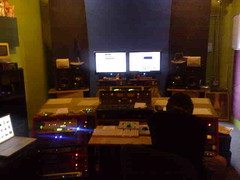Mastering Yourself
Mastering has retained a certain air of mystery that other areas of music production have long since lost. But is there really a wizard behind the curtain, or is it all smoke and mirrors and a large boomy voice?
Mastering Myths
Home Studio Corner recently posted about the idea of putting a compressor on the master bus, but the comment thread evolved into a debate on the validity of sending your mixes to a professional mastering engineer versus doing it yourself.
One point of view is that current software (such as Izotope’s Ozone mastering plugin) is perfectly capable of producing a high quality master from a home studio, and if you have the skills to create a decent mix, then chances are you also have the skills to create a decent master.
On the other hand, the received wisdom from veteran producers is that you shouldn’t master your own material, because you are too familiar with it to hear it objectively, and a professional mastering engineer will be able to apply considerable experience (using dedicated high-end equipment) to generally achieve better results.
Balancing The Mix
So who’s right? Of course, both approaches are perfectly valid, and will suit different situations. If you can afford it, it seems sensible to let a reputable professional put the finishing touches to your project – but good results can certainly be achieved at home too, with practice.
I think the main issue to understand here is that mastering is really about being able to hear exactly what is in the mix. Mastering houses have expensive monitoring environments that allow the engineer to hear the mix as it actually is – not just as it is in your bedroom, or in a car, or in a kitchen.
In a home studio, you might have some acoustic treatment and good monitors, but the room and the monitors are still colouring the audio somewhat. With time and practice, you may learn to compensate for this colouring – but if a project is important to you, it’s probably better to let someone with the right equipment and an objective ear determine what’s really going on in there.
Ultimately, if you want to spend more time making music, then delegate as much of everything else as you can to people who do it full-time – but if you really want to learn to master, then that’s where you should devote your time.
